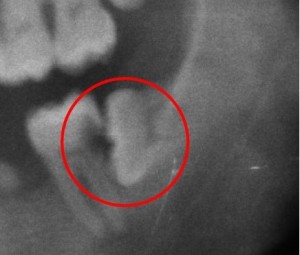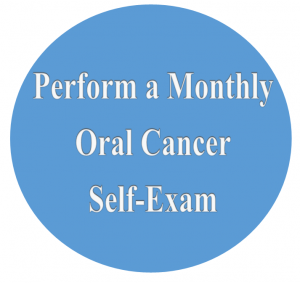
Decayed second molar caused by impacted wisdom tooth
Most adults have had wisdom tooth problems at some point in their life. How do you know if you need to have the teeth removed or not? The answer is not always dependent on whether or not you are experiencing tooth pain. While these teeth, clinically referred to as third molars, do not always need to be removed, there are quite a few reasons why your dentist might recommend wisdom teeth removal.
Wisdom Tooth Pain
Your third molars often cause pain when they erupt (come in to the dental arch). If the teeth are impacted, meaning they are trapped beneath gum tissue or bone, they can be chronically painful as the gums get inflamed or infected A tooth impacted only partially can become a food trap and harbor bacteria and plaque which cause tooth decay. Problems such as chronic infection, inflammation or cavities are indicators that wisdom teeth should be removed.
Cysts and Other Pathology
Sometimes, an impacted tooth forms a cyst around it. A cyst is a fluid filled sac that can grow to be quite large. As the cyst grows, it destroys healthy bone tissue in the jaw, which can cause a variety of dental problems. Most cysts that form around the third molars are benign, but can be destructive. Over time, the cyst can damage the molars adjacent to it, leading to tooth loss. If your dentist sees a cyst growing around a wisdom tooth, he will likely recommend that you have it along with the tooth removed in order to prevent damage to healthy teeth later on. A cyst around a tooth is often not painful or symptomatic, and is usually diagnosed using a panoramic x-ray.
Damage to Adjacent Teeth
When a tooth is impacted, it can be positioned in such a way that it tried to erupt directly into the roots of the tooth in front of it. When this happens, the roots of the adjacent teeth can become damaged to the point that they cannot be repaired. In a situation like this, the second molars are placed under a lot of pressure. The pressure causes the teeth to move out of alignment. Many people with impacted wisdom teeth find that their molars have shifted, causing them to frequently bite their cheeks when eating or talking.
Orthodontics and Wisdom Teeth
Many orthodontists recommend that their patients have their third molars extracted upon completion of their orthodontic treatment. This is advised in order to prevent shifting of the teeth caused by pressure from the wisdom teeth. After spending a year or two in braces, nobody wants their teeth to get crooked again! Extracting the third molars can often help prevent some orthodontic relapse.
Does Everyone Need Wisdom Teeth Removed?
Not everybody needs to have their third molars extracted. Some teeth come into the dental arch fully and in line with the other teeth. If they are not difficult to keep clean and healthy, and show no signs of pathology, your dentist may tell you to leave them alone. If your dentist recommends that you remove the teeth, it is a good idea to take care of the problem before major problems occur.
For more information about your wisdom teeth, or to schedule an appointment, visit Texas Wisdom Teeth and Dental Implants.


 World Cancer Day is February 4, 2015. The team at Texas Wisdom Teeth and Dental Implants wants you to know that early detection and prevention is the key when it comes to oral and pharyngeal cancer.
World Cancer Day is February 4, 2015. The team at Texas Wisdom Teeth and Dental Implants wants you to know that early detection and prevention is the key when it comes to oral and pharyngeal cancer.